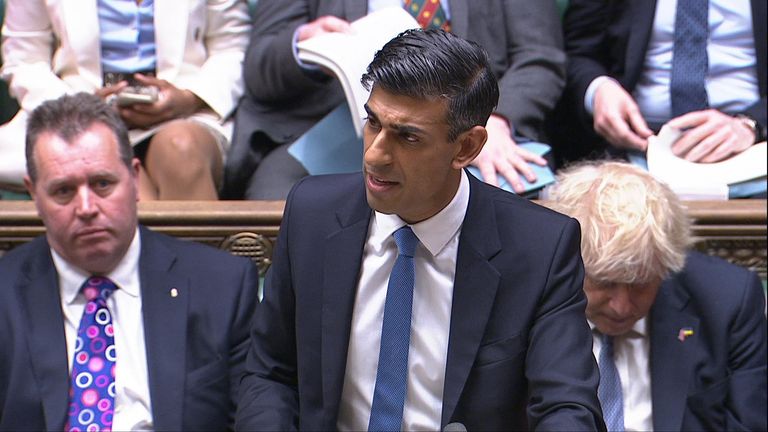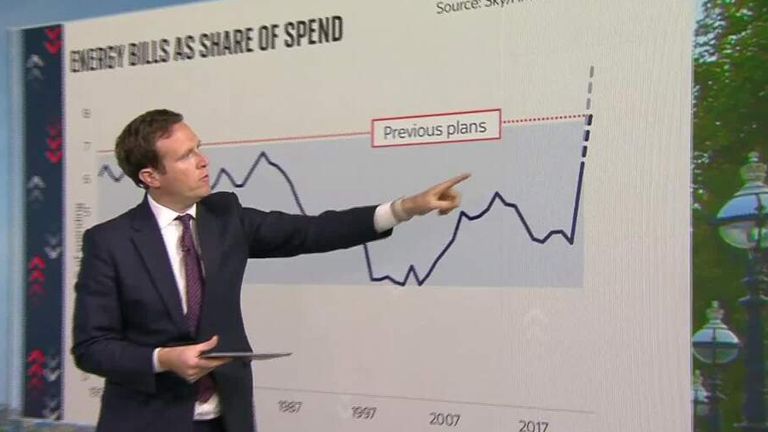Windfall tax on oil and gas firms: Rees-Mogg warns Sunak that no tax is ‘economically cost-free’
One of the government’s most loyal ministers has warned that a windfall tax on oil and gas companies will not be “economically cost-free”.
The tax was announced by Chancellor Rishi Sunak as part of a £21bn support package aimed at helping people cope with the rising cost of living.
But Jacob Rees-Mogg, the minister for Brexit opportunities and government efficiency, told Sky News that all taxation has an economic consequence.
Politics live: More Tories say Boris Johnson has lost their support
He said: “People need to understand that there is not a tax that you can take that is economically cost-free.
“It doesn’t matter which tax it is, it will have an economic consequence.
“Whether it’s a pasty tax, or it’s an excess profits tax, there is an economic consequence.
“There isn’t a honeypot of free tax that governments can just pop into.
“So as long as they raise the tax, knowing that it will have an economic consequence, which the chancellor does, then it is a matter of choosing between one form of revenue-raising and another.
“There is no non-tax way, ultimately, of spending. It is either today’s tax, or it’s tomorrow’s tax through borrowing.”
Cost of living latest: Martin Lewis responds to Sunak’s announcement
Mr Sunak‘s levy on the oil and gas firms has also faced criticism from the CBI – which suggested the tax could discourage investment – as well as the Conservative backbenches, where MP Richard Drax accused the chancellor of “throwing red meat to socialists”.
The levy is not just a one-off as it will only be phased out “if oil and gas prices return to historically more levels” and could be in place to the end of December 2025 – when a “sunset clause” will end the tax.
Measures announced by the chancellor in the Commons on Thursday included a one-off £650 payment to low-income households on benefits, paid in two instalments in July and in autumn at a cost of £5.4bn.
Pensioners will also receive a £300 payment in November/December alongside the winter fuel payment in a move costing £2.5bn, while £150 will be paid by September to people receiving disability benefits.
Mr Sunak announced that £5bn of the package would be paid for by the levy on the profits of oil and gas giants, and around £10bn will be covered by extra borrowing.
The chancellor attempted to avoid calling his plan for a 25% energy profits levy a “windfall tax”, as he was accused by Labour of having been dragged “kicking and screaming” into a U-turn on the policy the Opposition has spent months calling for.
But Simon Clarke, chief secretary to the Treasury, conceded it was a windfall tax, although one he said included a “carefully calibrated offer” due to its tax break incentives for companies to invest in North Sea oil and gas production.
When announcing his fiscal package in the House of Commons, Mr Sunak told MPs it was worth £15bn.
But officials later conceded that there was a hidden £6bn cost to the announcement, taking it to £21bn.
That is because over the next five years the original £200 rebate for energy bills, which was announced in February, and doubled and turned into a grant by the chancellor on Thursday, will no longer be paid back by consumers as originally planned.
Mr Sunak’s announcement came a day after senior civil servant Sue Gray’s damning report into lockdown parties in Downing Street, laying bare details of drunken parties, fighting and karaoke in the heart of government at a time when COVID-19 restrictions were in place.
In an interview with Martin Lewis, founder of the Money Saving Expert website, the chancellor was asked whether the fiscal measures had been quickly unveiled to act as a “fig leaf” after Ms Gray’s report.
He replied: “I can categorically assure you that that had no bearing on the timing for us announcing this support, and I can give you my absolute assurance on that and my word.”
Rishi Sunak will be speaking to Sky News about his £21bn support package just after 7am this morning




